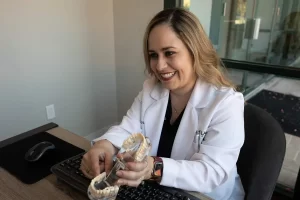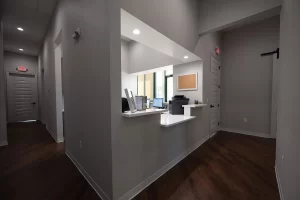Understanding the Cost of Dentures With Dr. Daigle
When it comes to restoring your smile and oral functionality by replacing missing teeth, dentures are a popular option. However, understanding the costs involved in dental care, including financing options and managing expenses associated with dentures, is crucial for making an informed decision. Additionally, it’s important to review various insurance plans to understand the extent of dental coverage for dentures, as private dental insurance typically offers some coverage, while marketplace health insurance may not always include dental coverage.
At Off the Trace Dental, our Slidell dentist and team are committed to bringing awareness to the cost of dentures to help guide our patients in making an informed decision. Contact Dr. Pamela Daigle today by calling (985) 214-2844 to schedule your consultation. We’ll discuss options to replace missing teeth and create a plan suited to meet your smile goals at our Slidell dental office.We also proudly serve patients coming from Eden Isle, Pearl River, and Lacombe.
 What Are Dentures?
What Are Dentures?
Dentures are customized prosthetic devices designed to replace missing teeth, restoring the natural appearance and function of the mouth. They are typically made of materials such as acrylic, ceramic, or porcelain, and are tailored to fit each individual’s unique needs. Dentures can be used to replace a single tooth, multiple teeth, or an entire arch of teeth. They provide a practical solution for individuals who have lost teeth due to various reasons, including tooth decay, gum disease, or injury. By filling the gaps left by missing teeth, dentures help improve both the aesthetics and functionality of your smile.
Types of Dentures
There are several types of dentures available, each with its own unique characteristics and benefits:
- Partial Dentures: Designed to replace one or more missing teeth, partial dentures are typically attached to the remaining natural teeth using metal clasps or other attachment methods. They help fill the gaps left by missing teeth and are supported by the remaining natural teeth.
- Complete Dentures: These dentures replace an entire arch of teeth and are usually held in place by suction or dental adhesives. They are ideal for individuals who have lost all their teeth in either the upper or lower jaw.
- Implant-Supported Dentures: Attached to dental implants that are surgically placed into the jawbone, these dentures provide a stable and secure fit. Implant-supported dentures offer enhanced stability and comfort compared to traditional dentures.
- Traditional Dentures: Made of acrylic or ceramic materials, traditional dentures are designed to be removable. They are a common choice for those seeking a non-permanent solution for missing teeth.
- Immediate Dentures: These temporary dentures are placed immediately after tooth extraction, allowing individuals to maintain their appearance and function while their mouth heals. Immediate dentures are a convenient option for those who do not want to go without teeth during the healing period.
How Much Do Dentures Cost?
Full or partial dentures may range from $600 to $1,500 per arch for basic types, while premium dentures can cost between $2,000 to $4,000 per arch. Partial dentures cost can vary widely depending on factors like location, materials used, and specific dental needs. The denture’s cost will vary based on factors like materials, quality, additional procedures, and more.
Factors that Affect the Cost of Dentures
The cost of dentures can vary significantly based on a range of factors. Those factors can include:
- Type of Denture: There are various types of dentures, such as implant-supported dentures and partial dentures. The more complex the denture design, the higher the cost.
- Material Used
- Acrylic Resin: Most commonly used, but it may wear more quickly.
- Porcelain: Often used for the front teeth because it looks more natural but is heavier and can wear down natural teeth.
- Metal: Often used in the structure of partial dentures.
- Flexible polymers: They can provide a comfortable fit but might be more expensive.
- Tooth Extractions: If tooth extractions are needed before fitting dentures, this will increase the total expenses incurred.
- Preliminary Treatments: Treatments like oral surgery, bone grafting, or treatment of gum disease can add to the overall expense.
- Dentist Location: Costs can vary based on the region or even the city where the treatment is received. Urban areas with higher costs of living may have pricier dental services.
- Dentist’s Experience and Reputation: Experienced and highly reputed dentists might charge more for their services.
Alternatives to Dentures
While dentures are a popular solution for replacing missing teeth, there are alternative options available:
- Dental Implants: Surgically placed into the jawbone, dental implants provide a permanent anchor for a crown or bridge. They offer a long-lasting and stable solution for replacing missing teeth.
- Dental Bridges: Fixed prosthetic devices that are attached to the surrounding teeth, dental bridges replace one or more missing teeth. They provide a natural-looking and functional replacement.
- Crowns: Individual prosthetic teeth that are attached to the remaining natural tooth using dental cement. Crowns are ideal for restoring the shape, size, and function of a damaged tooth.
- Veneers: Thin layers of porcelain or ceramic material bonded to the front of the teeth to improve their appearance. Veneers are a cosmetic solution for enhancing the look of your smile.
Dental Insurance and Financing Dentures in Slidell, LA
Dental Insurance
Are you wondering if your dental insurance covers dentures? Dental coverage varies significantly across different insurance plans, with private dental insurance typically offering some coverage for dentures, while marketplace health insurance may not always include dental coverage. Your dental insurance works based on the following:
- Coverage Level: Depending on the policy, dental insurance may cover a portion of the cost of dentures. Coverage levels vary from basic to comprehensive.
- Waiting Period: Some insurance plans have a waiting period before they’ll cover the cost of major procedures like dentures. Be sure to check the specifics of any insurance policy before purchasing.
- Annual Maximum: Many dental insurance plans have an annual maximum coverage amount. If the cost of the dentures exceeds this maximum, the patient will need to cover the remaining balance.
- In-Network vs. Out-of-Network: Dentists who are in-network with an insurance provider have negotiated rates, which can mean lower costs for the patient. Out-of-network providers may not offer these negotiated rates, potentially leading to higher out-of-pocket expenses.
- Preauthorization: Some insurance companies require preauthorization for major procedures, including dentures. This means that before getting the dentures, the dentist must get approval from the insurance company.
Financing
If insurance doesn’t cover the full cost, financing options are available. Understanding the costs associated with dentures and exploring financing options can significantly alleviate financial concerns for dental care expenses. You may consider looking into the following options:
- Dental Payment Plans: Many dental offices offer payment plans that allow patients to pay for their dentures over time. These plans might be interest-free or come with a minimal interest rate.
- Third-party Financing: Companies like Proceed Finance, Cherry, Sunbit offer financing specifically for medical and dental procedures. These can be interest-free if paid within a specific period or come with a set interest rate.
- Health Savings Account (HSA) or Flexible Spending Account (FSA): If available, patients can use their HSA or FSA to pay for dentures. These accounts allow individuals to set aside pre-tax dollars for medical expenses.
- Dental Schools: Some dental schools offer services, including dentures, at reduced prices. In these dental clinic settings, dental students (under the supervision of experienced instructors) provide the services.
Denture Maintenance and Repair With Off the Trace Dental
To ensure the longevity and functionality of dentures, regular maintenance and repair are essential. Here are some tips:
- Cleaning: Clean your dentures daily using a soft-bristled toothbrush and mild soap. Avoid using abrasive cleaners that can damage the denture material.
- Rinsing: Rinse your dentures with warm water after meals to remove food particles and prevent plaque buildup.
- Storage: When not in use, store your dentures in a protective case to prevent damage. Ensure they are kept in a moist environment to avoid drying out.
- Adjustments: Over time, dentures may require adjustments to ensure a proper fit and prevent discomfort. Regular dental check-ups can help identify and address any fitting issues.
- Repairs: If your dentures become damaged or broken, seek professional repair services. This can include relining, rebasing, or replacing the denture to restore its functionality.
By following these maintenance tips and maintaining regular dental check-ups, individuals with dentures can enjoy a healthy, functional, and confident smile for years to come. Contact our dentist in Slidell today at (985) 214-2844 to schedule an appointment.
Compassionate Denture Care with Dr. Pamela Daigle
If you’re considering dentures in Slidell, choosing the right dentist near you makes all the difference. Dr. Pamela Daigle is known not only for her clinical expertise but also for the comfort and confidence she brings to every patient experience.
A graduate of LSU with a Doctor of Dental Surgery degree, Dr. Daigle has years of experience creating custom dentures that look natural and feel comfortable. Her meticulous attention to detail ensures your dentures are made to fit your lifestyle and your smile. However, what truly sets her apart is her warm, patient-focused approach. Dr. Daigle understands how personal this journey can be, and she’s committed to making you feel informed, supported, and completely at ease from your first visit to your final results.
Whether you’re exploring dentures for the first time or looking to upgrade your current set, you’ll find personalized care and lasting results with Dr. Daigle.
Frequently Asked Questions
There are a few ways to save money on dentures:
- Get quotes from several dentists or prosthodontists
- Ask about financing options
- Consider getting partial dentures instead of full dentures
- Choose less expensive materials
- Look for discounts or coupons for low-cost dentures
- Partial dentures cost: Partial dentures can be a cost-effective option. The cost can vary widely depending on factors like location, materials used, and specific dental needs. Consult with a dentist or prosthodontist for an accurate estimate based on your individual circumstances.
The extent to which insurance covers dentures varies significantly depending on the type of insurance plan, including private dental insurance, marketplace health insurance, Medicare, and Medicaid. Some plans may cover a portion of the cost, while others may not cover it at all. It’s important to check with your insurance company to see if they cover the denture’s cost.
Full or partial dentures are used depending on the number of missing teeth, with full dentures replacing an entire set of teeth and partial dentures filling gaps left by missing teeth. The costs and types of these dentures can vary significantly, with full dentures typically resting on the gums and partial dentures being supported by remaining natural teeth. Discussing specific needs with dental professionals is crucial to understand the price variations and modern advancements in denture materials and fittings.
Let Us Help You Make an Informed Decision
Understanding your dentures’ cost empowers you to make a decision that aligns with your oral health needs and budget. Whether you opt for basic dentures, premium options, or explore alternatives, seeking professional advice is crucial.
If you live in Slidell, New Orleans, Mandeville, Covington, or any of the surrounding areas, our dental practice is here to answer any of your questions. Schedule a consultation today by giving our Slidell dental practice a call at (985) 214-2844.

 What Are Dentures?
What Are Dentures?